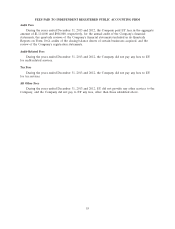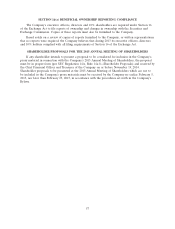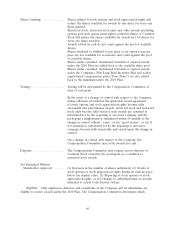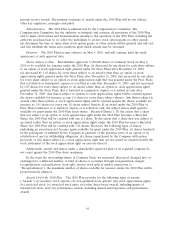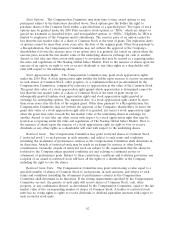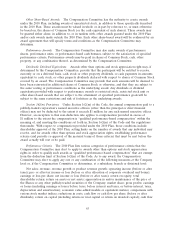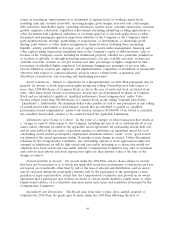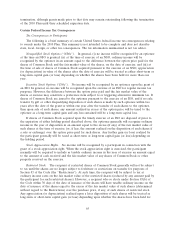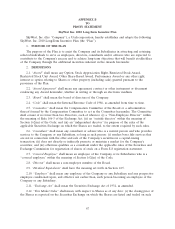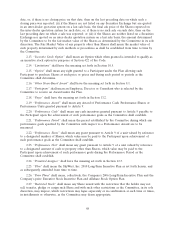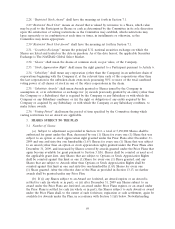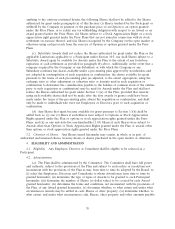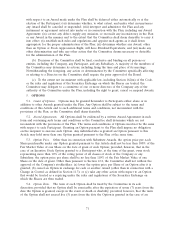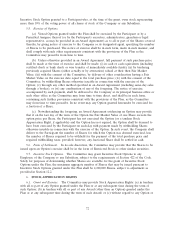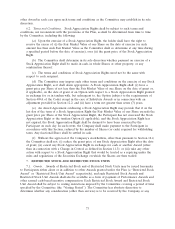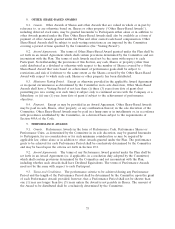SkyWest Airlines 2013 Annual Report Download - page 179
Download and view the complete annual report
Please find page 179 of the 2013 SkyWest Airlines annual report below. You can navigate through the pages in the report by either clicking on the pages listed below, or by using the keyword search tool below to find specific information within the annual report.termination, although grants made prior to that date may remain outstanding following the termination
of the 2010 Plan until their scheduled expiration date.
Certain Federal Income Tax Consequences
Tax Consequences to Participants
The following is a brief summary of certain United States federal income tax consequences relating
to awards under the 2010 Plan. This summary is not intended to be complete and does not describe
state, local, foreign, or other tax consequences. The tax information summarized is not tax advice.
Nonqualified Stock Options (‘‘NSOs’’). In general, (i) no income will be recognized by an optionee
at the time an NSO is granted; (ii) at the time of exercise of an NSO, ordinary income will be
recognized by the optionee in an amount equal to the difference between the option price paid for the
shares of Common Stock and the fair market value of the shares, on the date of exercise; and (iii) at
the time of sale of shares of Common Stock acquired pursuant to the exercise of an NSO, appreciation
(or depreciation) in value of the shares after the date of exercise will be treated as either short-term or
long-term capital gain (or loss) depending on whether the shares have been held for more than one
year.
Incentive Stock Options (‘‘ISOs’’). No income will be recognized by an optionee upon the grant of
an ISO. In general, no income will be recognized upon the exercise of an ISO for regular income tax
purposes. However, the difference between the option price paid and the fair market value of the
shares at exercise may constitute a preference item subject to or triggering alternative minimum tax. If
shares of Common Stock are issued to the optionee pursuant to the exercise of an ISO, and if no sale,
transfer by gift or other disqualifying disposition of such shares is made by such optionee within two
years after the date of the grant or within one year after the transfer of such shares to the optionee,
then upon sale of such shares, any amount realized in excess of the option price will be taxed to the
optionee as a long-term capital gain and any loss sustained will be a long-term capital loss.
If shares of Common Stock acquired upon the timely exercise of an ISO are disposed of prior to
the expiration of either holding period described above, the optionee generally will recognize ordinary
income in the year of disposition in an amount equal to the excess (if any) of the fair market value of
such shares at the time of exercise (or, if less, the amount realized on the disposition of such shares if
a sale or exchange) over the option price paid for such shares. Any further gain (or loss) realized by
the participant generally will be taxed as short-term or long-term capital gain (or loss) depending on
the holding period.
Stock Appreciation Rights. No income will be recognized by a participant in connection with the
grant of a stock appreciation right. When the stock appreciation right is exercised, the participant
normally will be required to include as taxable ordinary income in the year of exercise an amount equal
to the amount of cash received and the fair market value of any shares of Common Stock or other
property received on the exercise.
Restricted Stock. The recipient of restricted shares of Common Stock generally will not be subject
to tax until the shares are no longer subject to forfeiture or restrictions on transfer for purposes of
Section 83 of the Code (the ‘‘Restrictions’’). At such time, the recipient will be subject to tax at
ordinary income rates on the fair market value of the restricted shares (reduced by any amount paid by
the participant for such restricted shares). However, a recipient who so elects under Section 83(b) of
the Code within 30 days of the date of issuance of the shares will have taxable ordinary income on the
date of issuance of the shares equal to the excess of the fair market value of such shares (determined
without regard to the Restrictions) over the purchase price, if any, of such shares of restricted stock.
Any appreciation (or depreciation) realized upon a later disposition of such shares will be treated as
long-term or short-term capital gain (or loss) depending upon whether the shares have been held for
65


